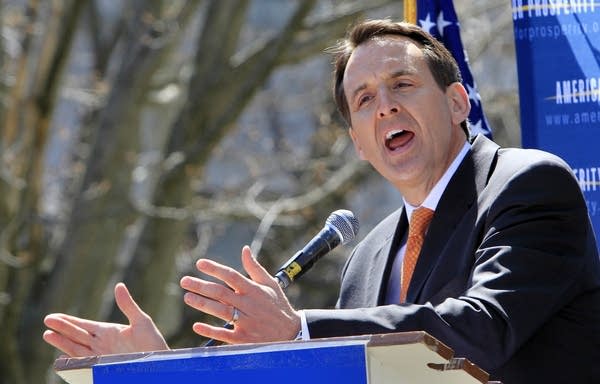Pawlenty campaign efforts not showing up in polling
Go Deeper.
Create an account or log in to save stories.
Like this?
Thanks for liking this story! We have added it to a list of your favorite stories.

For more than year, former Minnesota Gov. Tim Pawlenty has been acting like a candidate for president — making speeches, raising money and doling out campaign contributions across the nation.
A frequent guest on television and radio programs about politics, Pawlenty also has released several flashy self-promoting Internet videos. Behind the scenes, he has a team of presidential campaign experts on his side.
Still, all of this activity does not seem to be paying off for him. According to an analysis of March and April polling by RealClearPolitics.com, a website that reviews polling data from a variety of sources, among Republicans Pawlenty is averaging 3.4 percent support. Although political observers say the former governor still has a shot, he has a lot of ground to make up.
In those same polls, former Arkansas Gov. Mike Huckabee and real estate mogul Donald Trump receive an average of more than 17 percent support among Republicans. Former Massachusetts Gov. Mitt Romney receives more than 16 percent support.
Turn Up Your Support
MPR News helps you turn down the noise and build shared understanding. Turn up your support for this public resource and keep trusted journalism accessible to all.
Even U.S. Rep. Michele Bachmann, a relative newcomer in the field of prospective presidential candidates, is out polling Pawlenty by more than 0.5 percent.
The Pawlenty camp dismisses his low standing in the polls. They say it's clear that the former governor isn't that well-known outside of Minnesota, but they're are confident they'll be able to increase Pawlenty's popularity.
Pawlenty also could gain ground in New Hampshire, a key early contest. But he needs to get out among regular voters as soon as possible, said New Hampshire State Rep. Sam Cataldo, who met Pawlenty at a Republican county picnic last summer and became a big fan.

"Go to a house; that's what you do," Catldo said. "Sit down and have a cup of coffee with them. That's the New Hampshire way."
Among Republicans, however, candidates polling as low as Pawlenty is at this stage rarely end up securing the nomination, notes influential statistician Nate Silver.
Generally speaking, it's been that way since 1976, he said.
"The candidate who was ahead in the polls a year-and-a-half before the general election ... about six or nine months before the primary actually went on and won," said Silver, who writes the FiveThirtyEight blog for the New York Times.
But that wasn't the case in the 2008 cycle. John McCain ran second in early polls before eventually winning the Republican nomination.
Drake University political science Professor Dennis Goldford said he sees no reason for Pawlenty to worry about his low standing in the polls, at least for now. Goldford said early polls amount to Republican presidential wish lists and shouldn't be viewed as ratings of who's actually running.
At this point, money is more important, Goldford said.
"While you always like to have some good, healthy numbers, at this point the major need for those numbers would go to the question of fundraising," Goldford said. "But if Governor Pawlenty is raising the money he needs to raise, that's actually more indicative of where he stands than the actual poll numbers."
How well Pawlenty is attracting donors won't be clear until early July when his quarterly Federal Election Commission report is made public.
Goldford also said Pawlenty's low position in the polls now, could help boost his standing down the road if they confer low expectations.
"Of course, at some point, you've got to actualize your potential and exceed expectations, but I think that for right now it allows Pawlenty to operate under-the-radar if you will," Goldford said.
A critical poll for Pawlenty comes in mid-August when the Iowa Republican Party holds its annual fundraiser and straw poll. The Ames, or Iowa Straw Poll, is considered a first test of organizational strength in that state which holds the first caucuses.




